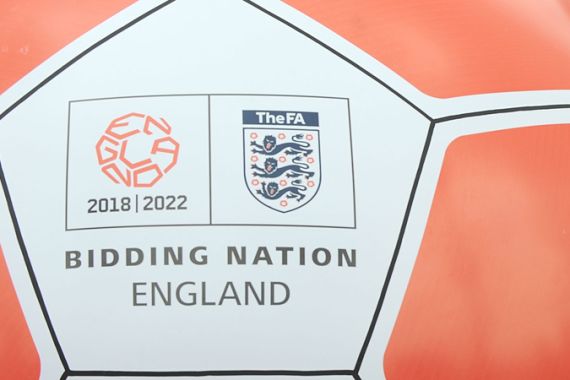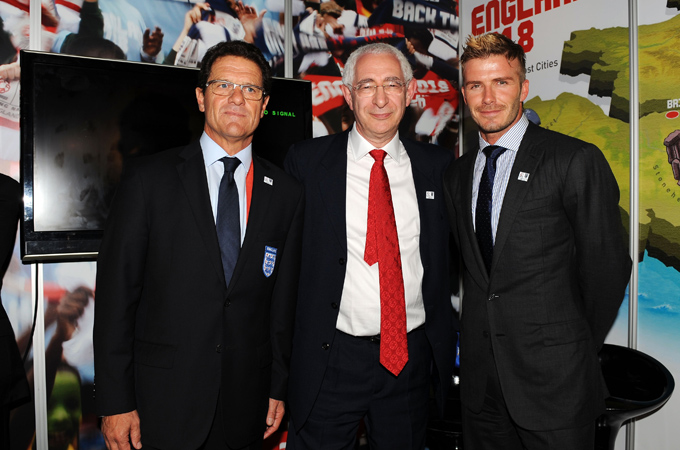Former FA chairman alleges FIFA corruption
Ex-English football chair accuses FIFA members of improper behaviour during 2018 and 2022 World Cup bidding process.

 |
| Lord Triesman, centre, pictured with England coach Fabio Capello and David Beckham, was initially chairman of England’s losing bid team [GALLO/GETTY] |
Six executive committee members of world football’s governing body FIFA stand accused of asking for favours in return for their votes for the 2018 and 2022 World Cup bids.
In a British parliamentary hearing on Tuesday, former English Football Association chairman David Triesman accused Jack Warner, Ricardo Teixeira, Nicolas Leoz and Worawi Makudi of asking for favours in return for their votes for England’s 2018 bid.
Keep reading
list of 4 itemsBellingham’s late El Clasico winner leaves Madrid with one hand on La Liga
Man Utd win FA Cup semifinal thriller against Coventry on penalties
Manchester City vs Chelsea 1-0: FA Cup semifinal – as it happened
British parliamentarians also revealed the names of two other FIFA Executive Committee members, vice-president Issa Hayatou from Cameroon and Jacques Anouma from the Ivory Coast, who, it is alleged, were paid $1.5 million to vote for Qatar’s successful 2022 World Cup bid.
‘Unethical’ behaviour
The allegations were made in the Culture, Media and Sport Committee of the House of Commons, which is looking at England’s failed bid as part of a wider inquiry into football governance.
David Triesman, the chairman of England’s 2018 bid until his resignation in May last year, accused the FIFA officials of “improper and unethical” behaviour ahead of last December’s vote in Zurich.
“These were some of the things that were put to me personally, sometimes in the presence of others, which in my view did not represent proper and ethical behaviour on the part of members of the executive committee,” Triesman said.
Triesman revealed that Jack Warner, the influential head of the North and Central American federation CONCACAF, had demanded to be paid directly around $4 million for construction of schools in Trinidad.
Triesman, who had met Warner along with England 2018 deputy chairman Sir Dave Richards, said the request was rejected immediately.
“I said immediately the proposition was out of the question. Sir Dave said ‘You must be joking Jack. You’re probably talking about £2.5 million.’
“Jack nodded at that. He said that the money could be channelled through him and he would guarantee the funds would be appropriately spent.”
‘Donation’
In a second incident involving Warner, Triesman revealed how the Trinidadian had sought a £500,000 “donation” to secure the rights to broadcast the 2010 World Cup in Haiti to lift the spirits of the earthquake-shattered nation.
Warner later dismissed Triesman’s allegations as a “piece of nonsense” in a statement to British broadcaster Sky Sports.
“I’ve never asked Triesman nor any other person, Englishman or otherwise, for any money for my vote at any time,” Warner stated.
In another episode, Triesman revealed that Paraguayan Nicolas Leoz, the head of the South American federation CONMEMBOL, had requested a knighthood during a meeting in Asuncion in November 2009.
|
“I said it was completely impossible, we didn’t operate like that. He shrugged his shoulders and walked away.” David Triesman |
“I said it was completely impossible, we didn’t operate like that. He shrugged his shoulders and walked away,” Triesman said.
The same month, Triesman and English bid members met Brazilian official Ricardo Teixeira on the sidelines of a England-Brazil friendly in Doha.
After remarking to Teixeira that he was happy to have heard positive sentiment about England’s bid from former Brazilian president Luiz Inacio Lula da Silva, Teixeira had replied: “Lula is nothing – you come and tell me what you have for me.”
The fourth official named by Triesman was Thailand’s Worawi Makudi, who had demanded to be awarded broadcasting rights of a possible friendly match between England and Thailand in Bangkok that had been pencilled in for 2011.
England were knocked out in the second round of the World Cup ballot, mustering just two of 22 votes. Russia later went on to win with 13 votes.
Triesman said he had feared damaging England’s bid if he had gone public with the incidents he detailed.
“The point was not pressed,” he said. “And I think, in retrospect, we would have burned off our chances. In retrospect that was not the right view to take and I accept that.”
 |
| Sepp Blatter announces Qatar’s winning bid in December last year [GALLO/GETTY] |
Qatar voting
The bidding contest had already been rocked ahead of the vote last December by an undercover investigation by The Sunday Times newspaper in Britain that led to two of FIFA’s 24 executive committee members being suspended.
Amos Adamu of Nigeria was found guilty by FIFA’s ethics court of soliciting bribes from undercover reporters, while Reynald Temarii of Tahiti was banned for breaching rules on confidentiality and loyalty.
Some of the newspaper’s evidence was never published, but it was sent to the British committee’s legislators on Monday to be made public using parliamentary privilege.
“The Sunday Times’ submission, and this is to be published by us later, claims that $1.5 million was paid to FIFA executive committee members Issa Hayatou and Jacques Anouma, who went on to vote for Qatar,” Collins said.
Citing the evidence, Collins claimed that Qatar employed a middleman to arrange deals with African members to secure their votes.
The claims are an embarrassment for the game’s governing body with a total of eight of its 24-strong key decision-making executive committee having now been accused by the British media or its parliamentary representatives of corruption.
Its 75-year-old president Sepp Blatter will stand for a further four-year term at its helm on June 1 in Zurich.
Blatter said he will ask for evidence of the claims made in the committee hearing and forward any allegations to the FIFA ethics committee.
“I cannot say they are all angels or they are all devils,” he said of the executive members.
“We must have the evidence and then we will act immediately against all those (who) would be breach of the ethical code rules,” Blatter added.